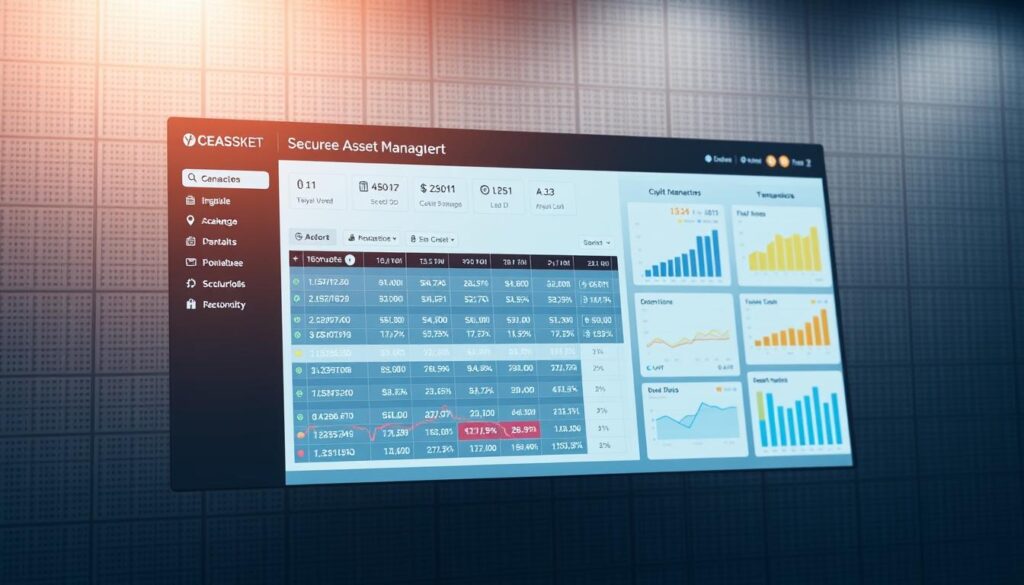Managing crypto taxes across exchanges needs a clear plan. Investors trade on platforms like Coinbase, Binance, or Kraken. Each trade creates tax records, and missing info can cause errors in tax reporting. This guide helps simplify compliance for U.S. taxpayers.
Trading on different exchanges makes tracking buys, sells, and transfers harder. The IRS sees all crypto deals as taxable. Keeping records well is key to avoid penalties and ensure accuracy.
Key Takeaways
- Using multiple exchanges complicates tax reporting but is avoidable with systematic tracking.
- Incorrect cryptocurrency tax reporting may trigger IRS audits or fines for unreported gains.
- A centralized approach to managing crypto taxes across exchanges reduces compliance risks.
- Automated tools simplify cross-exchange data consolidation and filing.
- Consistent recordkeeping ensures alignment with IRS guidelines for all transactions.
Understanding the Crypto Tax Landscape in 2023
Managing cryptocurrency tax reporting needs clear rules. The IRS sees crypto as property, not money. This changes how we figure out gains and losses. Keeping up with federal rules and new laws is key to crypto tax compliance.
Current IRS Guidelines for Cryptocurrency
IRS notices like Notice 2014-21 and Revenue Ruling 2019-24 set the rules. All crypto deals must be reported on tax forms. The Form 1040’s crypto question now asks for details on crypto activities. This shows the IRS is watching more closely.
Key Tax Events for Crypto Investors
- Selling or exchanging crypto for fiat or other assets
- Receiving crypto as payment or rewards
- Hard forks or airdrops resulting in new holdings
Each event means you have to report taxable activity. Not doing so can result in penalties.
The Evolving Regulatory Environment
Congress is looking to make crypto tax rules stricter. Exchanges might start sending data to the IRS, making things more transparent. Investors need to adjust their plans to follow crypto tax rules as they change.
Why Managing Crypto Taxes Across Exchanges Is Challenging
Managing crypto taxes across different exchanges is tough. Each platform tracks transactions in its own way. For instance, centralized exchanges like Coinbase give detailed reports. But, decentralized platforms like Uniswap often don’t have standard tracking tools.
- Inconsistent Reporting Formats: Some exchanges leave out important details like fees or airdrops.
- Asset Tracking Gaps: Moving crypto between platforms can lead to missed trades in tax filings.
- Documentation Barriers: Overseas exchanges like Binance may not meet U.S. IRS requirements, risking compliance issues.
- Transaction Classification Conflicts: Trades, staking, and DeFi activities are labeled differently across platforms.
These issues get worse when investors use many accounts or trade globally. Without a single system, mistakes in cost basis or missed deadlines are common. To manage taxes right, we need tools that combine data from all platforms into one place.
Essential Recordkeeping for Crypto Transactions
Effective cryptocurrency tax reporting starts with keeping detailed records. Every trade, transfer, or transaction must be documented. This meets IRS standards and makes audits easier. Here’s how to create a system that follows digital asset tax management best practices.

Transaction Data You Need to Track
Record these details for every transaction:
- Date and time
- Type (buy/sell, transfer, staking)
- Crypto amount and USD value at time of transaction
- Fees paid in crypto or fiat
- Counterparty wallet addresses (if applicable)
Organizing Records by Exchange
Use dedicated folders or cloud storage for each exchange. Tools like Koinly or CoinTracking auto-import transaction data from multiple platforms. This creates a unified ledger. Label files with dates and exchange names for quick reference.
Regularly reconcile exchange statements with personal records to avoid discrepancies.
Documentation Timeframes: How Long to Keep Records
IRS guidelines require keeping records at least three years past the tax filing date. High-risk trades (like NFT sales or staking rewards) may need longer retention. Blockchain’s immutable ledger means data persists forever, but physical records must still comply with legal deadlines.
Retain records digitally using encrypted cloud storage. This balances accessibility and security.
Understanding Cost Basis Methods for Cryptocurrency
Choosing the right cost basis method is key to lowering tax implications of trading crypto. The IRS asks crypto traders to keep track of cost basis for capital gains or losses. The method you pick can greatly change your taxable income.
FIFO vs. LIFO vs. Specific Identification
- FIFO (First-In, First-Out): Uses the oldest coins first. Good for long-term holdings with smaller gains.
- LIFO (Last-In, First-Out): Taxes the latest coins first. Helps in market declines to cut taxable gains.
- Specific Identification: Allows you to pick exact coins sold. Needs detailed records to prove which assets were sold.
How Your Cost Basis Choice Affects Tax Liability
In 2023, a trader selling $50,000 worth of Bitcoin could face different tax bills. For example:
- FIFO in rising markets might increase taxable gains.
- LIFO in a bear market could lower reported profits.
- Specific Identification lets you choose low-cost basis coins to lower liabilities.
Consistency Requirements Across Exchanges
The IRS requires using the same method for crypto tax compliance across all exchanges. Changing methods without proof can lead to audits. All exchanges must report using the same method. Specific Identification needs written records for each sale.
Cross-Exchange Tax Reporting Strategies
Effective cross-exchange tax management starts with a centralized system. This helps organize data from every platform. Cryptocurrency tax reporting needs consistency, especially when exchanges label transactions differently. Follow these steps to avoid errors:
- Use tax software that imports transaction data from all exchanges automatically. This creates a single source for tracking buy/sell dates, prices, and fees.
- Map inconsistent terms like “swap” or “yield farming” to IRS-defined categories. Standardizing labels prevents misclassification on filings.
Missing transaction records can be reconstructed using blockchain explorers. Compare transaction hashes with bank transfer records to fill gaps in exchange histories. Track deadlines for Form 1099-B releases using a calendar, noting deadlines, and set reminders for filings.
- Reconcile quarterly reports from each exchange to spot discrepancies before tax season.
- Keep all documentation for at least six years—the IRS’s standard audit period.
Automated tools simplify cryptocurrency tax reporting by highlighting mismatches. Regular audits of your central ledger ensure compliance even when exchanges update their reporting systems.
Top Crypto Tax Software Solutions for Multi-Exchange Users
Crypto tax software makes it easier for investors with accounts on many exchanges. The right tool helps track taxable events like trades and airdrops. Look for platforms that make it simple to combine data from different exchanges and follow IRS rules.
Features to Look for in Cross-Exchange Tax Tools
Good crypto tax calculator tools have:
- Automated API connections with big exchanges like Binance, Coinbase, and Kraken
- Historical price databases for accurate cost basis calculations
- Tracking for DeFi and NFT transactions
- Options to export Form 8949 and Schedule D
Pricing Comparison of Popular Options
Top choices vary by how many transactions you have and what features you need:
- CoinTracker: Flat $49/year, unlimited transactions
- CoinLedger: $59-$129 based on trades
- Koinly: €39 basic plan to €99 advanced
- TokenTax: $59-$199 tiered by transaction count
Integration Capabilities with Major Exchanges
Tools vary in which exchanges they support:
- CoinLedger connects with 40+ exchanges, including decentralized ones
- ZenLedger focuses on US reporting for Gemini and FTX
- TokenTax supports 300+ wallets and DeFi protocols
Some users find it hard to track NFTs on certain platforms. CoinTracker is great for complex staking rewards. Always check if the software works with your exchanges before you choose it.
Step-by-Step Guide to Managing Crypto Taxes Across Exchanges
Managing crypto taxes across exchanges needs a clear plan. Start with these steps to get your data in order and follow IRS rules:
Creating a Comprehensive Exchange Inventory
- Make a list of all exchanges and wallets used, noting when you started and stopped. Track the types of transactions, like trades or transfers.
- Keep records of account IDs, API access keys, and past statements for audits. Check the IRS guidelines for what you need to include.
Consolidating Transaction Data
- Get CSV files from each exchange, making sure time zones and currency columns are correct.
- Use tax software to automatically import your data. For missing info, fill it in manually with templates.
- Check if the totals match your current portfolio value to find any mistakes early.
Reconciling Discrepancies Between Platforms
- Compare the dates and amounts on different exchanges. If USD values don’t match, it might mean you missed reporting some sales.
- Use blockchain explorers like Etherscan to check on-chain transactions.
- Fix any differences in your records before you file to avoid fines.
Keeping your data consistent helps avoid mistakes. For example, FIFO/LIFO methods need accurate dates to figure out gains. Regular checks of your inventory and reports help you stay up to date with tax laws.
Tax Implications of Exchange-to-Exchange Transfers
Moving cryptocurrencies between exchanges usually doesn’t trigger taxes. But, it’s key to track these moves well for tax reports. The IRS says moving the same asset between places isn’t taxable. Yet, not keeping records can mess up your tax numbers, making gains or losses look bigger than they are.
- Record every transfer’s transaction hash, timestamp, and wallet addresses.
- Note network fees paid in cryptocurrency; these reduce your cost basis for future sales.
- Avoid mislabeling crypto-to-crypto transfers as sales when moving assets. Example: swapping ETH for USDT during a transfer creates a taxable event.
When you move crypto, make sure tools like CoinTracker or Coinledger get it right. Getting trades wrong can lead to IRS checks. Always check that your records match what the exchanges show. This way, you avoid fines and make tax time easier.
Common Mistakes When Reporting Multi-Exchange Crypto Activity
Many people make mistakes when reporting their crypto taxes. This is often because they miss important details when trading across different platforms. A study found that 40% of traders forget about key transactions when switching exchanges. Here are three common errors to watch out for:

Missing Transactions During Exchange Migrations
When moving assets between platforms, records can get split. Closures of exchanges or wallet transfers can lead to missing data. For example, moving Bitcoin from Binance to Coinbase without recording it can create taxable events. To avoid this, track all movements and check balances every quarter. Use tools like CoinTracking or Koinly to keep your data in one place.
Incorrect Classification of Crypto-to-Crypto Trades
Many traders think swapping one crypto for another is tax-free. But the IRS sees these swaps as taxable. For example, swapping ETH for BTC can trigger capital gains. Stablecoins like USDT are taxed as property, not as money. Always use the fair market value at the time of trade to calculate your basis.
Overlooking Gas Fees and Transaction Costs
Gas fees on Ethereum and other networks affect your cost basis. Every transaction fee adds to the value of your assets. For instance, $50 in gas fees when buying $1,000 of ETH makes the cost basis $1,050. If you ignore these fees, you’ll underreport your expenses. Use blockchain explorers like Etherscan to track fees accurately for better crypto tax compliance.
Handling International Exchanges and FBAR Requirements
US taxpayers using crypto exchanges outside the country have special reporting duties. The Foreign Bank Account Reporting (FBAR) rule asks for details on foreign financial accounts. This includes crypto wallets or exchanges with over $10,000 at any time in a tax year. Not reporting can result in big penalties.
Crypto on foreign exchanges might also need Form 8938 filings if it’s worth more than IRS limits. Important points include:
- Reporting accounts with total value over $10,000 (for single filers) or $16,000 (for married filing jointly)
- Keeping records of all transactions, even if exchanges don’t have crypto tax compliance tools
- Keeping records that show ownership, transaction dates, and asset values
Exchanges with weak KYC protocols are riskier. Use blockchain tax solutions to track cross-border activity automatically. Tools like CoinTracking or Koinly help with multi-currency balances and FBAR reports. Always remember the exchange’s reporting currency to avoid mistakes.
Get advice from tax experts who know about international crypto holdings. Keep up with changing rules to avoid crypto tax compliance issues. Good documentation and using software are key to meeting FBAR and IRS rules.
DeFi, NFTs, and Staking: Special Tax Considerations
Crypto has grown beyond simple trades. Now, we have DeFi protocols, NFTs, and staking. These need special digital asset tax management to avoid mistakes. Decentralized exchanges (DEXs) make tracking hard due to yield farming and liquidity pools. NFT sales also have unique value challenges.
Decentralized Finance (DeFi) Activity
- Liquidity providers must report income from token swaps and fees as taxable events.
- Yield farming rewards are taxed as ordinary income when received, even for obscure tokens.
- Fair market value disputes arise for tokens without clear price data—keep detailed records to prove values.
NFT Transactions
Selling NFTs on platforms like OpenSea or Rarible triggers capital gains. Challenges include:
- Royalties paid to creators count as taxable income.
- Multi-platform sales require tracking every transaction’s purchase and sale price.
Staking and Protocol Rewards
Staking income from protocols like Solana or Ethereum demands clarity: rewards are taxable as ordinary income in the year received. Taxpayers must:
- Aggregate rewards from multiple staking platforms into one report.
- Document reward distribution dates and corresponding token values.
These complexities need proactive tax implications of trading crypto planning, especially with DeFi, NFTs, and staking. Automated tools often miss edge cases—manual recordkeeping is key for compliance.
Working with Tax Professionals Who Understand Cryptocurrency
Choosing a tax professional who knows about cryptocurrency is key for correct cryptocurrency tax reporting. Look for CPAs or attorneys certified by groups like the Digital Asset Tax Institute. Make sure they have experience with blockchain tax solutions for different exchange portfolios.

- Verify expertise in DeFi, staking rewards, and hard fork taxation
- Request examples of past client scenarios involving cross-platform trades
- Ensure understanding of IRS Form 1040 Schedule D nuances for crypto
Good professionals will explain how they solve differences between exchange records. Stay away from advisors who don’t get the unique aspects of crypto. Signs they might not know their stuff include not knowing about cost basis for airdrops or not using tools like CoinTracker or Koinly.
Get ready for meetings by organizing your trades in order. Bring:
- Complete CSV export files from all exchanges
- Documentation of non-trade events (forks, airdrops)
- Previous year’s tax filings for comparison
Fees should reflect the complexity of crypto. Hourly rates often start at $200+ for specialized services. Always ask for examples of how they’ve handled unique crypto tax issues like NFT sales or decentralized exchange activity.
Audit-Proofing Your Crypto Tax Reporting
To ensure crypto tax compliance, you must take proactive steps. Audits require detailed records. Follow these strategies to protect your position:
Documentation Best Practices
- Save screenshots of every transaction not captured in exchange exports
- Track DeFi smart contract interactions with timestamped logs
- Archive price verification sources for each trade’s valuation date
Responding to IRS Inquiries
When contacted:
- Reply within 30 days using certified mail for formal notices
- Organize submissions by tax year and exchange platform
- Reference IRS Publication 544 for asset valuation guidance
Voluntary Disclosure Considerations
If you’ve made errors in crypto tax reporting, consider the IRS’s Delinquent Filer Initiative. File an amended Form 1040-X with the correct Schedule D entries. This is for:
- Forgotten DeFi staking rewards
- Unreported NFT sales across platforms
- Exchange-to-wallet transfers treated as nontaxable
Keep your cryptocurrency tax reporting consistent across all platforms. Consistent records help during audits. Professional tax advisors can guide you in following IRS rules.
Future-Proofing Your Crypto Tax Management Strategy
Crypto investors need to stay ahead of changing tax rules. Rules like those in EY’s report show the importance of crypto tax calculators. These tools help track new asset types and adapt to global and DeFi transactions.
Using these tools for regular audits keeps you in line with IRS rules. Keeping records up-to-date, like tracking NFT sales, avoids mistakes. It’s also smart to check in with your tax team every quarter.
Don’t forget to plan for life events like estate transfers or donating crypto. Stay updated with platforms that alert you to tax changes. This way, you can handle today’s tax needs and be ready for tomorrow’s.
FAQ
How do I report cryptocurrency trades from multiple exchanges?
To report trades from different exchanges, start by gathering data from each platform. Use tools like CoinTracker or ZenLedger to import and organize your transactions. Make sure to use the same cost basis method for all platforms to report accurately.
What are the tax implications of moving crypto between exchanges?
Moving crypto between exchanges usually isn’t taxable. But, it’s key to track these moves to keep your cost basis right. Keep records of transaction hashes, timestamps, and wallet addresses. Also, remember that fees paid during transfers can change your cost basis.
How does blockchain technology affect crypto tax compliance?
Blockchain helps with crypto tax by making transactions clear and unchangeable. This makes it easier to track your crypto. But, you must keep detailed records to report all your transactions, especially when using different exchanges.
Which tax software is best for managing crypto across platforms?
The top crypto tax software should connect with many exchanges, track prices accurately, and support various exchanges. Options like CoinTracker, TokenTax, and Koinly offer different features and pricing for different needs.
What are common mistakes when handling crypto tax reporting?
Mistakes include missing transactions, wrong trade classification, and forgetting about gas fees. To avoid these, keep detailed records and check your transactions on all exchanges carefully.
How long should I retain records of my cryptocurrency transactions?
The IRS wants you to keep records for three to seven years. Since blockchain transactions are permanent, keeping good records helps protect you from audits or disputes.
Are decentralized exchanges treated differently for tax purposes?
Yes, DEXs have unique tax rules because of their transactions. Activities like liquidity provision and token swaps can be tricky to report. It’s important to track each transaction well and know how the IRS views these activities.
How can I avoid IRS scrutiny during audits of my crypto activities?
To avoid IRS trouble, use the same accounting methods for all transactions and keep detailed records. Also, document any tax deductions for transaction costs and fees. Getting help from crypto tax experts can also help you follow the rules.
What are FBAR requirements for international exchanges?
If you have crypto in foreign exchanges and your total balance is over ,000, you might need to file an FBAR. Keeping accurate records of these holdings is crucial for meeting international tax standards.
How does the IRS view staking rewards?
The IRS sees staking rewards as ordinary income when you get them. For tax purposes, you need to track the value of these rewards at the time you receive them. Also, consider the tax implications of rewards from different protocols.


No comments yet